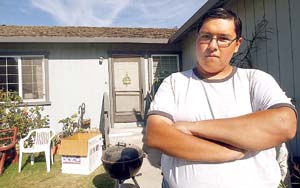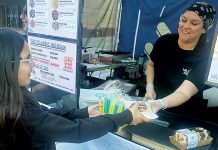
Sinuhue Zuniga has made mistakes. His biggest was Feb. 2 when he
allowed Robert Bravo, his brother’s troubled friend, to enter the
family home.
Sinuhue Zuniga has made mistakes. His biggest was Feb. 2 when he allowed Robert Bravo, his brother’s troubled friend, to enter the family home.
Alone during the day watching TV and playing video games, a knock on the door became a nightmare he may never escape. Zuniga, 19, probably should’ve died at the hands of his attacker.
Bravo asked to use the bathroom, while another man with him asked Zuniga to borrow his chess game. Zuniga obliged.
Without warning on his way to get a glass of water, his back turned, Zuniga felt a sudden jab of cold steel pierce through his left side, and an agonizing pain like none he’d felt before.
With a knife in hand, Bravo pushed Zuniga to the floor of his mother’s Monica Court home. Bravo, 27, slashed and jabbed at Zuniga’s heavyset body leaving 15 stab wounds – one to his heart, another to his throat – and little hope for survival.
“I was just hoping that I would live through it,” said Zuniga, a San Jose native and Hollister resident, in a recent interview. “But from the looks of things, I figured it wouldn’t happen.”
What started as a simple household burglary left an innocent young man fighting for life. He nearly lost the battle on an emergency helicopter flight to San Jose before rescuers revived his failing heart.
Zuniga was rushed into multiple surgeries, spent a month in a coma and somehow survived.
When he awoke, he endured three weeks of therapy to learn to walk again, to use the bathroom again. His medical bills totaled more than $1 million. The family’s currently trying to find an insurer to help pick up the tab.
Zuniga lived, but the horror didn’t end. Not even close.
The family doesn’t have closure.
They likely never will.
Bravo was arrested in Sacramento four days after the attack and later confessed to the stabbings and burglary – he stole a few possessions, such as an entertainment center, from the home.
He was charged with attempted murder, attempted robbery and burglary – and potentially faced nearly 20 years behind bars.
But his Salinas defense lawyer, Bud Landreth, told San Benito County prosecutors he’d aggressively pursue a plea that could avoid prison time – not guilty by reason of insanity. Bravo has a history of mental illness that goes back many years, Landreth said in an interview Thursday. Landreth called Bravo “a real psycho.”
Prosecutors made a judgment call, as District Attorney John Sarsfield called it this week.
Instead of taking the risk of Bravo walking, the prosecution offered a lesser charge with a lighter sentence: assault with a deadly weapon, along with an enhancement for causing great bodily injury. The prison sentence? Eight years and four months, which Landreth accepted. Bravo also will have a strike against him under the Three Strikes law.
Zuniga and especially his mother, Rita Moreno, were, still are, thunderstruck.
They can’t believe a man who brutally attacked and nearly killed Zuniga will be back on the street within nine years.
Furthermore, they say they first learned of the plea bargain weeks after May 25 when the deal had been completed and a judge had accepted the sentence.
If she knew about the district attorney’s intentions to negotiate a plea, Moreno would have protested vehemently, she said.
“How in the hell do you think a jury would have been sympathetic to a man who did this to my son?” Moreno said Thursday. “He’s not a drug addict. He’s an animal.”
Sarsfield wasn’t aware the family possibly hadn’t been notified about the plea bargain, he said Thursday. It’s up to the office’s victim witness division, he pointed out, to notify victims and keep them updated on court proceedings. If the two-member staff didn’t do that, he said, “I’ll look into it.”
Sarsfield also said his lean staff of attorneys means he has to plea bargain many more cases than he’d prefer.
“We do not have the resources, as given by the Board of Supervisors, to take every case to trial,” he said.
About Bravo’s sentence, Sarsfield said he sympathizes with Zuniga’s family. The district attorney added his own family was recently victimized when their two dogs were poisoned.
“But a sure thing is better than risking it and potentially having him get off,” Sarsfield said.
Moreno, though, doesn’t see it that way. She questioned whether the prosecution was naive about the case and Landreth’s pursuit of an insanity plea.
She said victim witness staffer Julie Roybal was helpful and friendly. Roybal even helped her prepare an “impact statement” to appeal the plea bargain.
“I just want some closure to this,” Moreno said.
A haunting memory
As Zuniga lay on the floor of his mom’s house shortly before noon on that fateful day, he begged Bravo to stop slashing away at his body, blood draining from wounds to his chest, his throat, his liver.
Zuniga tried fighting back, but to no avail. Bravo was too big, Zuniga’s injuries too exhausting.
Zuniga remembers trying to get up at least once, but Bravo knocked him down and stuck him again in the stomach. Zuniga took it as a warning. If he tried rising again, he thought, Bravo would finish him off.
Zuniga recalls Bravo then asking his acquaintance, standing outside the front door during the attack, to come in the house. The other man was shocked at what he saw, Zuniga said.
The men bolted from the house, but Bravo’s friend promptly returned and called 911, said Zuniga, who was still conscious at the time.
It was on a life-flight to the hospital when Zuniga lost his struggle to stay awake, which he felt was necessary for survival. On that ride he stopped breathing.
A nicer place, a safer home
Moreno got the call from authorities that day while working at Mineta San Jose International Airport. From that point on, she said, “my mind was flying.”
“I don’t even know how the heck I drove to the hospital. I was in tears,” she said.
Shortly after she arrived, a surgeon came out to tell her he was in critical condition and probably wouldn’t live, she said.
Moreno took a week off work to stay at her son’s side. During the month he spent in a coma, she visited daily. It could’ve been her last chances to be in his presence.
During the attack, the knife had nicked Zuniga’s heart. It cut his liver and both lungs; one of them collapsed. Bravo slit Zuniga’s throat.
Zuniga remembers waking only a few times. He recalls being in a strange bed, a tube down his throat, an eerie ambiance of dim hospital lights.
When he did open his eyes, he didn’t think about life or death, he said.
“At that point I was too wigged out to care,” he said.
But his once life-threatening injuries healed. The helicopter emergency crew later asked the hospital staff if Zuniga lived, Moreno said. They were shocked, thought it was a miracle, he survived, she said.
Zuniga also recollects when one of his two older brothers, Tlaloc, whose connection with Bravo led the attacker to the house, saw him for the first time in that hospital bed.
His older brother was remorseful for what happened, said the youngest of three Native American siblings. Before that day, Zuniga had never seen his brother cry.
After finishing therapy to re-learn basic skills, nearly two months after the assault, he went home.
Zuniga, whose own troubled youth led to two short stints in juvenile hall, whose father is incarcerated for another 11 years for homicide, is glad to have a new chance at life.
He may pursue a job in landscaping, which he had planned – before the attack – to do this summer.
And despite frequent, painful flashbacks, Zuniga has opposed his mother’s offers to move back to San Jose.
“If we left town, that would be taking the coward’s way out,” he said. “I would rather stay and just face it.”









